Via ISUR, Engineering Undergrads Conduct Research, Present at Virtual Expo
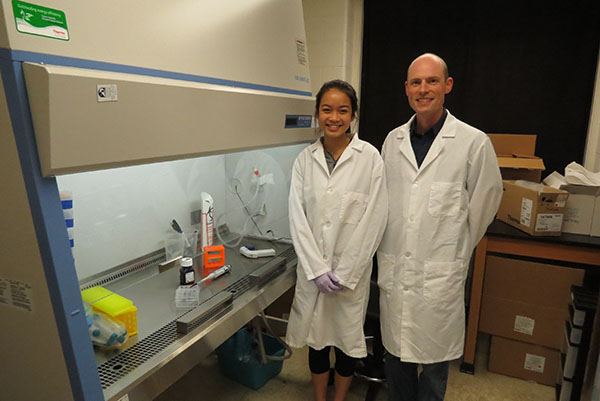 Bioengineering junior Joy Chen, with her mentor, cancer researcher Dr. Erik Nelson. (Image courtesy of Joy Chen.)
Bioengineering junior Joy Chen, with her mentor, cancer researcher Dr. Erik Nelson. (Image courtesy of Joy Chen.)
May 8, 2020
As in years past, Grainger College of Engineering’s Illinois Scholars Undergraduate Research (ISUR) Program provided support for 52 students conducting research alongside Illinois researchers during summer 2019 and the 2019–2020 school year. However, unlike its predecessors, the virtual edition of ISUR’s Research Expo 2020, held from April 24th–May 1st lacked a crowded room full of brightly colored posters. Also missing weas the cacophony of voices simultaneously discussing research as students presented to visitors face to face. Due to COVID-19, this sort of venue was prohibited. However, just like its predecessors, the spring 2020 Expo gave 41 undergraduate researchers a chance to share their research with interested peers, colleagues, and visitors. Each of this year’s crop of students created a poster or PowerPoint, presented their research orally, and even “stood” ready to field visitors’questions…all facilitated virtually.
Under the ISUR umbrella this past year was a cadre of undergraduate researchers who participated in a range of research in the following different engineering areas: Tissue and Cells; Biomaterials, Muscles, and Bones; Materials; Design; Air and Water Quality; Imaging, Circuits, and Sensors; and Computing Systems and Security. Regarding ISUR's overarching goal, Natasha Johanna Mamaril, Engineering's Associate Director of undergraduate Research, claims that "Undergraduate research is a transformative learning experience. Through research experiences, students learn to see their future selves as scientists and engineers.".
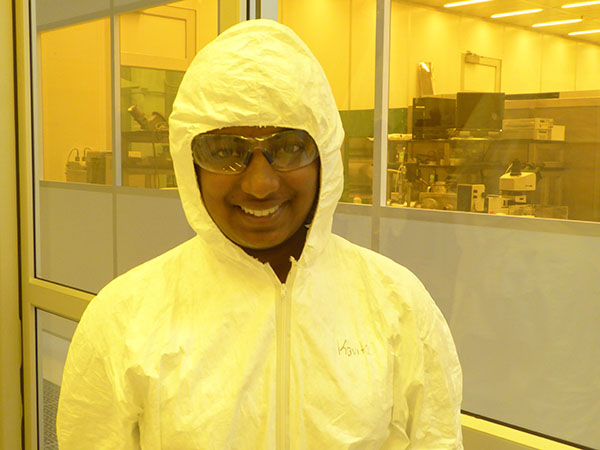 Darin Butz Scholar Nisha Kolagotla ready to conduct research in ECE's Clean Room. (Image courtesy of Nisha Kolagotla.)
Darin Butz Scholar Nisha Kolagotla ready to conduct research in ECE's Clean Room. (Image courtesy of Nisha Kolagotla.)
ISUR subgroups were delineated by funder and/or research emphasis. For example, ISUR itself provided a two-semester, authentic research experience with 38 undergrad participants imbedded in working labs, mentored by graduate students, postdocs, and faculty; they became familiar with the research process, developed research skills, and discovered what grad school is like. New under ISUR in 2019–2020, was the IBM-ILLINOIS Center for Cognitive Computing Systems Research (C3SR) Undergraduate Research in Artificial Intelligence (URAI) initiative, which gave 12 both domestic and international students two-semester research experiences in artificial intelligence (AI). Also under the ISUR umbrella were two female engineering undergraduate students who conducted research in summer 2019 sponsored by the DaRin Butz Foundation Research Scholarship program, which seeks to encourage women to pursue careers in science and engineering.
Capping off students’ research experiences was the spring 2020 Virtual Expo, with most of the undergraduate researchers from the three groups participating. However, unlike previous ISUR poster expos, where students presented their posters gathered in a larger venue, such as an Illini Union Ballroom, due to COVID-19’s no-groups-larger-than-ten and mandatory-6-feet-apart social distancing restrictions, this sort of venue was prohibited. However, because a key component of ISUR is giving student researchers the opportunity to present their research, thus exposing them both to what researchers do and what grad school is like, ISUR held a virtual poster session from April 24th–May 1st, 2020. This encouraged students to reflect on their research and articulate their findings, organizing key points on a Powerpoint and providing their oral presentation via an on-line venue. Visitors were even encouraged to email the undergrads with any questions.
While the on-line venue was a bit different than what they had expected, ISUR scholars found both their research experience and the Expo to be invaluable. They report gaining valuable lab skills, a clearer understanding of whether or not they wish to pursue research as a career, and brushed up on the presentation skills.
Mamaril shares the impact of spring 2020's Expo, which was reflected in students' statements regarding its benefits: "Every year, we plan and prepare for in-person poster presentations. This year, we had to adapt to the circumstances brought about by the COVID-19 pandemic. The virtual expo challenged our students to do their best to disseminate information about their respective research projects in a different format. Through the virtual research expo, our students were still able to share information, communicate the science behind their research, and to use their creativity in presenting their projects."
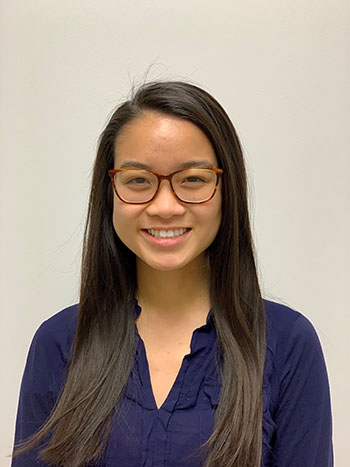 Bioengineering junior Joy Chen. (Image courtesy of Joy Chen.)
Bioengineering junior Joy Chen. (Image courtesy of Joy Chen.)
One ISUR participant was Joy Chen, a junior in bioengineering, who, for the past three years, has been doing cancer research under Dr. Erik Nelson in the Department of Molecular and Integrative Physiology. She actually joined his lab the summer before her freshman year and has thoroughly enjoyed her work with Nelson these past few years. “Performing research has allowed me to explore the field of cancer research and gain many laboratory skills, all of which will be useful to me as I continue towards a career as a researcher,” she says.
Her research focuses on how 27-hydroxycholesterol (27HC), a metabolite of cholesterol, affects breast cancer reemerging from dormancy and future metastasis. Her research this past year focused on a type of white blood cell called neutrophils, required for 27HC to function. “So I am looking into any underlying mechanisms they may undergo to cause this reemergence from dormancy,” Chen explains.
Chen indicates that through her undergraduate research at Illinois with Nelson, she has not only learned the science behind cancer and cancer research, but increased her understanding of “the impact this kind of research will have on the world.” In fact, it’s significantly impacted her career plans. She hopes to continue research after she graduates and plans on pursuing a Ph.D. in Biomedical Engineering. “Cancer research is very intriguing and is at the forefront of what many researchers are studying,” she says. “I would love to incorporate engineering ideas and solutions into my research.”
Chen says she's gained a great deal through her research experience over the last few years, both as a researcher and personally. “Doing research throughout my undergraduate career has taught me so much,” she asserts. “When I started research many years ago, I didn’t even know how to use a pipette. Now, I can smoothly run through procedures because they are second nature to me.”
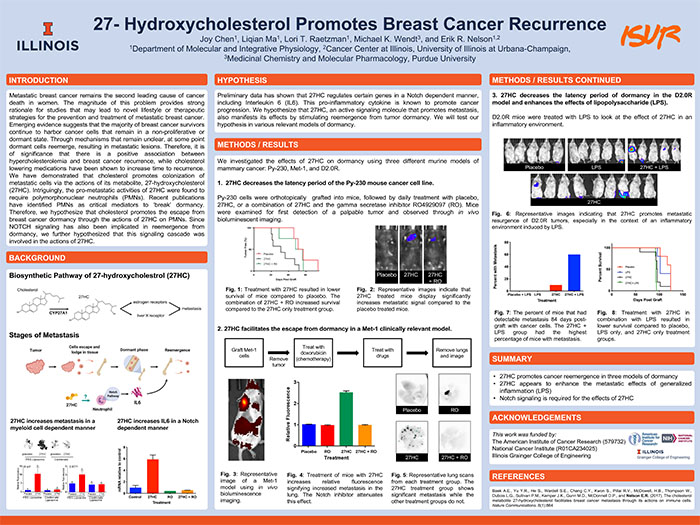 Joy Chen's poster about her cancer research. (Image courtesy of Joy Chen.)
Joy Chen's poster about her cancer research. (Image courtesy of Joy Chen.)She’s even had the opportunity to design her own experiments, saying it “has really allowed me to see how much I’ve grown as a researcher,” she says. Being a student researcher has also helped her grow personally; she’s become more organized, plus has grown comfortable sharing about her research.
“Being responsible for my own experiments and coordinating my academic schedule to make sure my experiments are done in a timely fashion have driven me to be organized and efficient with my time,” she explains, adding, “I’ve also gained so many interpersonal skills from presenting my research at national conferences and sharing my passions with other people.”
Chen’s dream job is to incorporate biomedical engineering ideas into cancer research in her own research lab. “I want the impact of my research to positively affect people all over the world,” she admits, “and I want to teach and influence others to delve into this field as well.”
What did Chen gain from participating in the ISUR expo itself? She calls it “ a great experience for me to bring together the research I’ve been doing these past couple of years and showcase it in a poster presentation.” She adds that even though the expo was virtual, she “still really enjoyed it and got to learn about so many other projects!”
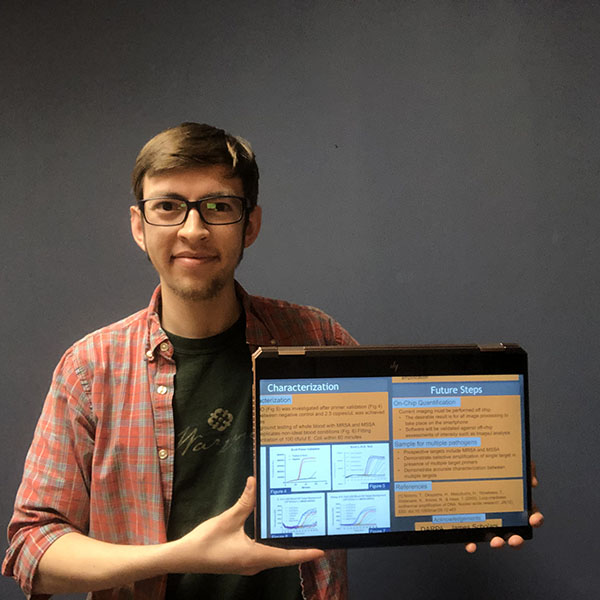 BioEngineering junior John Heredia shows off his ISUR Expo presentation. (Image courtesy of John Heredia.)
BioEngineering junior John Heredia shows off his ISUR Expo presentation. (Image courtesy of John Heredia.)
BioEngineering junior John Heredia began doing research near the end of his freshman year, working with Dr. Enrique Valera and his current ISUR mentor Jacob Berger. He worked under Dr. Rashid Bashir’s lab group, fabricating microfluidic components for sepsis detecting devices. While he still does research in Dr. Bashir’s lab, this past year their focus has been on lab-on-a-chip diagnosis of pathogens from patient whole blood. His role has been to help carry out testing procedures like performing DNA amplification tests, characterizing the results of reactions, and optimizing device components.
According to Heredia, research has provided a real-world application for much that he has learned.
“Performing research has to be one of the most fulfilling and enjoyable activities I have done,” he admits. “I love how real all the coursework of my education becomes—I performed tests or used techniques that I had only previously read about. Hands-on work enhances my skill with these concepts like classroom assignments never can.”
Heredia indicates that one of the biggest impacts of his research experience has been his grad student mentor, Jacob Berger, claiming he’s the biggest factor in shaping the positive experience he’s taken away through the past year.
“Jacob has years of experience and an awesome attitude towards research with a high-maintenance and sometimes clueless undergraduate. Jacob has been committed to help me learn and is always available when I need assistance. I’m never afraid to ask questions because of his patient approach—and I undoubtedly would not have learned as much without him.” In fact, Heredia is continuing to work with Berger on the same project next semester, and is excited to see the progress they’ll make.
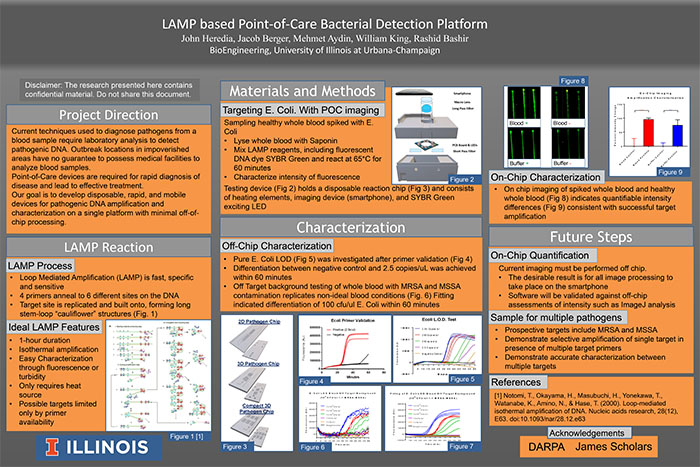 John Heredia's presentation poster. (Image courtesy of John Heredia.)
John Heredia's presentation poster. (Image courtesy of John Heredia.)One thing the Bioengineering junior has discovered about research is that it isn’t always smooth sailing. “Any progress made in the lab over the past year was never straightforward. So many problems are possible, from a misstep in procedures to a confounding variable that still hasn’t been found. Research is frustrating, but I find that I’m the most focused when things go wrong—and finding a good solution is an amazing feeling!”
Heredia’s dream job would be hands-on lab work in biomechanics or microfluidic diagnostics, similar to what he’s done in ISUR. “I enjoy the process of lab work,” he stresses, “and I think I’d be too restless to handle a completely administrative lab position.”
Heredia was glad the ISUR expo wasn’t cancelled but still held online. In fact, he claims he improved his skills through using the on-line venue.
“Honestly, the biggest thing I took away from that came from recording my presentation without an audience!” he asserts. “Without anyone to hear me live, I got stressed doubting whether my message would come across as I intended it. Eventually, though, I had to take the plunge and push past my doubts—and I think the presentation actually went very well!”
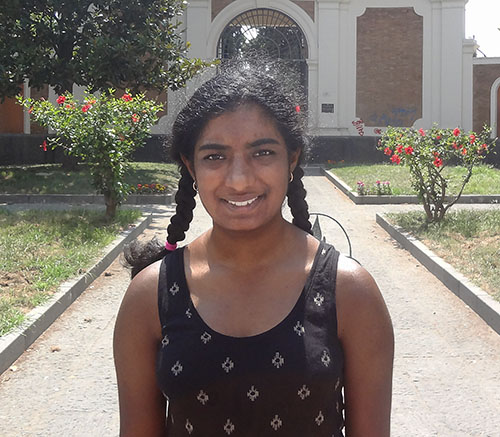 ECE sophomore Nisha Kolagotla. (Image courtesy of Nisha Kolagotla.)
ECE sophomore Nisha Kolagotla. (Image courtesy of Nisha Kolagotla.)
For Darin Butz Scholar Nisha Kolagotla, an ECE sophomore studying Electrical Engineering, this was not her first research experience. In high school, she received a Welch summer research scholarship to do research at the University of Texas at Dallas. Plus, she has been working in ICORLAB under Professor Bayram since her freshman year. “I am very grateful to Professor Bayram for giving me this opportunity,” she says. Kolagotla’s work with Bayram this past year was independent research studying the effect of temperature on the electrical and optical properties of Gallium Nitride LEDs.
Kolagotla, who’s been interested in research for a long time, definitely wants to continue in research, and intends to pursue graduate school. However, though she really likes LED research, she admits that because she’s a sophomore, she hasn’t studied several areas of Electrical Engineering yet, so she’s not sure what other areas might interest her.
Claiming she “really enjoyed conducting research during the summer,” Kolagotla explains that, because of her scholarship, she was able to work in the lab for 40 hours a week “without any distractions.” Over the ten-week period, she got training on an Atomic Force Microscope, Clean Room procedures, and a heating station—skills she needed to conduct her research.
“I acquired many invaluable research skills like the ability to read and process advanced technical material, develop good research habits, and presentation skills.”
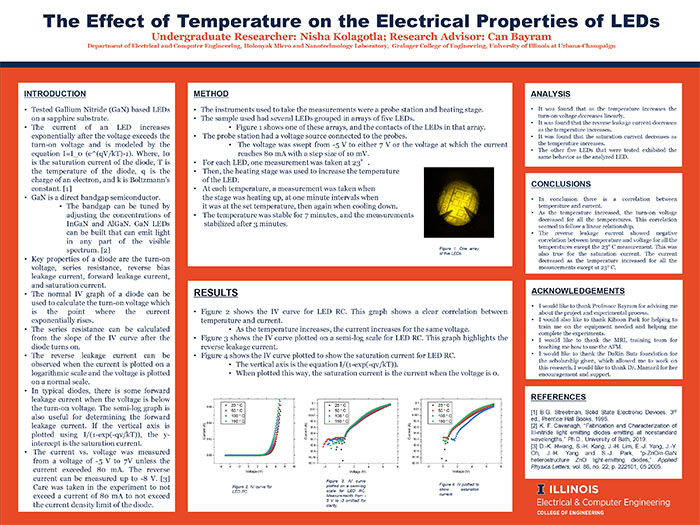 Nisha Kolagotla's poster on LEDs. (Image courtesy of Nisha Kolagotla.)
Nisha Kolagotla's poster on LEDs. (Image courtesy of Nisha Kolagotla.)
For instance, before beginning her current project, she had to read several documents, including journal papers, a PhD thesis, and other technical documents, and understand the material in them. “This is a very valuable research skill that I acquired,” she admits.
Regarding other benefits of conducting research, Kolagotla says, “I think research and coursework go hand in hand. The hands-on work done in research helps solidify my concepts. At the same time, I would not be able to conduct research without learning the basic concepts in class.”
She adds that participating in the expo was also a learning experience. Having taken part in several science fairs, she reports that she has presented projects in person to judges and answered their questions; however, this was her first time doing a recorded presentation. She acknowledges, “I had a lot of difficulty recording my presentation. I am quite comfortable presenting face-to-face, but I was having difficulty speaking clearly when I knew that I was being recorded. Every time I listened to my recording, I found something that needed to change. I need to work on that skill.”
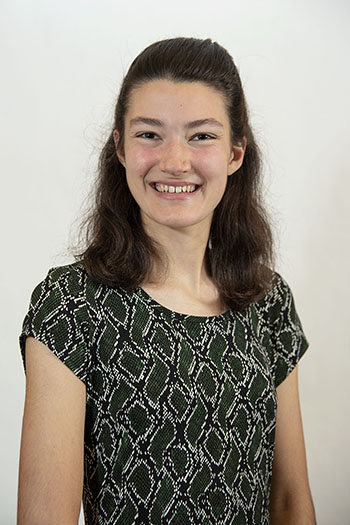 ISUR scholar, Civil Engineering sophomore Lauren Schissler. (Image courtesy of Lauren Schissler.)
ISUR scholar, Civil Engineering sophomore Lauren Schissler. (Image courtesy of Lauren Schissler.)
A third ISUR undergraduate researcher, Civil Engineering sophomore Lauren Schissler, has been involved in research as an undergrad assistant with Professor David Lange's group since spring 2019. She works with graduate student, Karthik Pattaje, her ISUR mentor. Schissler’s responsibilities have included assisting with mixing concrete and learning concepts about developing concrete for 3D printing.
Schissler shares how participating in ISUR this year has impacted her. “It was my first experience having my own research project and making decisions about how the project should be conducted,” she admits. “I was a lot more involved and committed to research as a result of joining the ISUR program.”
In her research project, she measured the yield stress of cement paste to characterize its behavior for developing a standard reference material (SRM) for wet concrete. “An SRM would mimic the behavior of concrete and save resources by eliminating the need for researchers to mix a new batch of concrete for each rheological measurement...especially helpful for 3D printing concrete research,”” she explains.
Schissler says her research experience was quite valuable. “I learned a lot!” she maintains. “I found my work interesting and engaging. It was fun having the freedom to make decisions about my project, and I liked exploring topics that are not covered in typical engineering classes.”
As with most research, she encountered some challenges but grew because of them. “There were definitely some parts of my project that didn't go as smoothly as expected,” she admits, “and one of the biggest things I learned is that patience is critical.”
Despite the difficulties, she plans to continue the same research project with the ISUR program next year. “I decided to continue because I want to keep making discoveries and diving into the similarities between concrete and other material combinations,” she says.
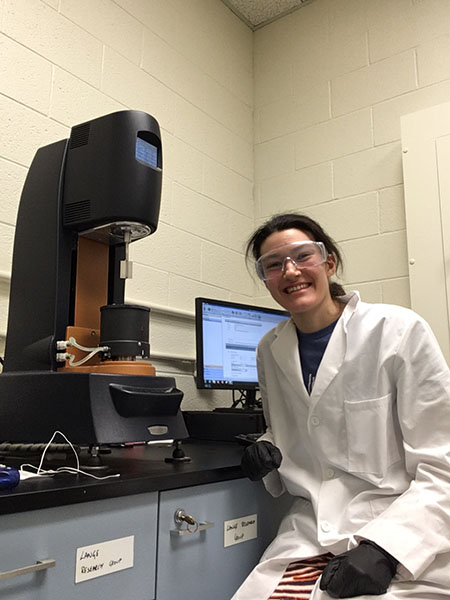 ISUR scholar Lauren Schissler conducting research in Newmark Lab. (Image courtesy of Lauren Schissler.)
ISUR scholar Lauren Schissler conducting research in Newmark Lab. (Image courtesy of Lauren Schissler.)
Schissler claims she’s benefitted in a number of ways through her research experience. “In addition to gaining technical skills and knowledge related to my research field, I've also improved my ability to plan long-term and short-term ideas simultaneously. In my research, I am always thinking about how my current work relates to the long-term goals of the project.” She indicates that when the results are not as initially expected, she must consider the big picture.
She has also gained confidence in terms of research. “Furthermore,” she adds, “there is not a "correct" answer or step-by-step guide about how to complete my project; instead, I need to have the confidence to make decisions based on my own knowledge, while consulting with my graduate mentor and faculty sponsor when necessary.”
Might research be in her future? “While I am not exactly sure what my career will hold at this point,” she declares, “my dream job would involve working on large, complex, challenging engineering projects with tangible results. I plan to be an environmentally friendly engineer and incorporate sustainable methods to improve civil engineering infrastructure for years to come.” She adds that, in addition to materials, she’s also interested in structural engineering and design.
Regarding participating in the ISUR expo, Schissler calls it “a great opportunity for me to reflect on what I accomplished this year and develop goals for moving forward with my project next year. I liked the challenge of explaining my research project in a way that was approachable for others and conveyed the key points.” She adds that she also enjoyed watching the other researchers' presentations and learning about their projects.
Story and photographs by Elizabeth Innes, Communications Specialist, I-STEM Education Initiative.
More: Engineering, Undergrad, Undergrad Research Symposia, 2020
For more I-STEM articles about Engineering undergraduate research, see:













.jpg)
















